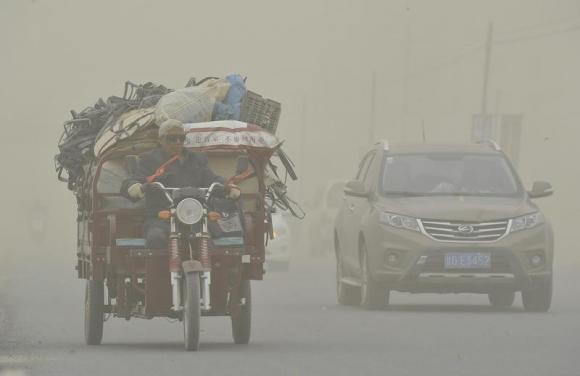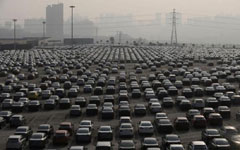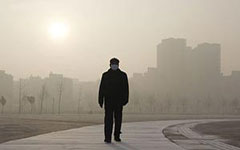 |
|
A motorcyclist rides past a car during a dust storm in Hami, Xinjiang Uygur autonomous region, April 23, 2014.[Photo/Agencies] |
China plans to take more than 5 million ageing vehicles off its roads this year in a bid to improve air quality, with 330,000 cars set to be decommissioned in Beijing alone, the government said in a policy document published on Monday.
Pollution has emerged as an urgent priority for China's leaders as they try to reverse the damage done by decades of economic growth and head off public anger about the state of the nation's air, water and soil.
In a wide-ranging action plan to cut emissions over the next two years, China's cabinet, the State Council, said the country had already fallen behind in its pollution targets over the 2011-2013 period and was now having to step up its efforts.
|
 |
|
 |
According to Beijing's environmental watchdog, vehicle emissions in Beijing were responsible for about 31 percent of the hazardous airborne particles known as PM 2.5, with 22.4 percent originating from coal burning.
Beijing plans to limit the total number of cars on the road to 5.6 million this year, with the number allowed to rise to 6 million by 2017, the local government has said.
The policy document also set new targets for the closure of coal-fired heating systems as well as the installation of equipment to reduce sulphur dioxide and nitrogen oxide emissions at power stations, steel mills and cement plants.
It said China is aiming to cut carbon emissions per unit of economic growth by more than 4 percent this year and more than 3.5 percent in 2015 as it tries to meet a binding 17-percent target set in its 2011-2015 five-year plan.
China also seek to reduce energy consumption per unit of growth by 3.9 percent this year and the next in order to meet a 16 percent target for the 2011-2015 period.
It will also aim to meet its 2011-2015 targets to cut outdated capacity in sectors like steel, glassmaking and cement by the end of this year, one year ahead of schedule. On top of the original targets, it will also close an additional 15 million tons of steel smelting capacity and 100 million tons of cement making capacity next year.
The document said China would step up efforts to create market mechanisms to reduce pollution, with the aim of establishing nationwide platforms that would allow enterprises to trade energy consumption and emission permits.
It also promised to provide more policy support for China's clean-up programme, and would implement a new differential power pricing system aimed at encouraging efficiency and punishing wasteful enterprises, as well as improve financial support for projects designed to reduce emissions.
